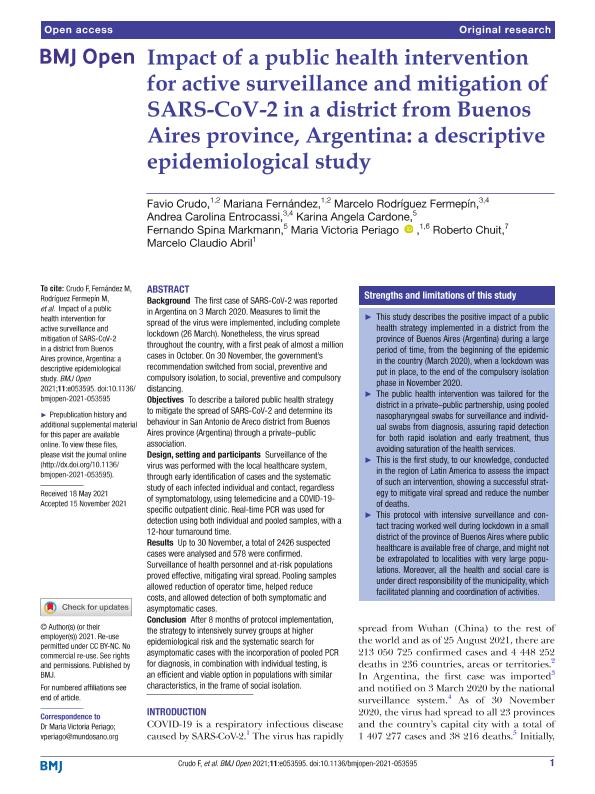Mostrar el registro sencillo del ítem
dc.contributor.author
Crudo, Favio
dc.contributor.author
Fernández, Mariana
dc.contributor.author
Rodríguez Fermepín, Marcelo
dc.contributor.author
Entrocassi, Andrea Carolina

dc.contributor.author
Cardone, Karina Angela
dc.contributor.author
Spina Markmann, Fernando
dc.contributor.author
Periago, Maria Victoria

dc.contributor.author
Chuit, Roberto
dc.contributor.author
Abril, Marcelo Claudio
dc.date.available
2022-01-07T12:40:59Z
dc.date.issued
2021-11
dc.identifier.citation
Crudo, Favio; Fernández, Mariana; Rodríguez Fermepín, Marcelo; Entrocassi, Andrea Carolina; Cardone, Karina Angela; et al.; Impact of a public health intervention for active surveillance and mitigation of SARS-CoV-2 in a district from Buenos Aires province, Argentina: a descriptive epidemiological study; BMJ Publishing; BMJ Open; 11; 11; 11-2021; 1-9
dc.identifier.issn
2044-6055
dc.identifier.uri
http://hdl.handle.net/11336/149767
dc.description.abstract
Background The first case of SARS-CoV-2 was reported in Argentina on 3 March 2020. Measures to limit the spread of the virus were implemented, including complete lockdown (26 March). Nonetheless, the virus spread throughout the country, with a first peak of almost a million cases in October. On 30 November, the government's recommendation switched from social, preventive and compulsory isolation, to social, preventive and compulsory distancing. Objectives To describe a tailored public health strategy to mitigate the spread of SARS-CoV-2 and determine its behaviour in San Antonio de Areco district from Buenos Aires province (Argentina) through a private-public association. Design, setting and participants Surveillance of the virus was performed with the local healthcare system, through early identification of cases and the systematic study of each infected individual and contact, regardless of symptomatology, using telemedicine and a COVID-19-specific outpatient clinic. Real-time PCR was used for detection using both individual and pooled samples, with a 12-hour turnaround time. Results Up to 30 November, a total of 2426 suspected cases were analysed and 578 were confirmed. Surveillance of health personnel and at-risk populations proved effective, mitigating viral spread. Pooling samples allowed reduction of operator time, helped reduce costs, and allowed detection of both symptomatic and asymptomatic cases. Conclusion After 8 months of protocol implementation, the strategy to intensively survey groups at higher epidemiological risk and the systematic search for asymptomatic cases with the incorporation of pooled PCR for diagnosis, in combination with individual testing, is an efficient and viable option in populations with similar characteristics, in the frame of social isolation.
dc.format
application/pdf
dc.language.iso
eng
dc.publisher
BMJ Publishing
dc.rights
info:eu-repo/semantics/openAccess
dc.rights.uri
https://creativecommons.org/licenses/by-nc-sa/2.5/ar/
dc.subject
COVID-19
dc.subject
DIAGNOSTIC MICROBIOLOGY
dc.subject
EPIDEMIOLOGY
dc.subject
PUBLIC HEALTH
dc.subject.classification
Epidemiología

dc.subject.classification
Ciencias de la Salud

dc.subject.classification
CIENCIAS MÉDICAS Y DE LA SALUD

dc.title
Impact of a public health intervention for active surveillance and mitigation of SARS-CoV-2 in a district from Buenos Aires province, Argentina: a descriptive epidemiological study
dc.type
info:eu-repo/semantics/article
dc.type
info:ar-repo/semantics/artículo
dc.type
info:eu-repo/semantics/publishedVersion
dc.date.updated
2022-01-06T13:44:47Z
dc.journal.volume
11
dc.journal.number
11
dc.journal.pagination
1-9
dc.journal.pais
Reino Unido

dc.description.fil
Fil: Crudo, Favio. Fundación Mundo Sano; Argentina
dc.description.fil
Fil: Fernández, Mariana. Fundación Mundo Sano; Argentina
dc.description.fil
Fil: Rodríguez Fermepín, Marcelo. Universidad de Buenos Aires. Facultad de Farmacia y Bioquímica. Instituto de Fisiopatología y Bioquímica Clínica; Argentina. Universidad de Buenos Aires. Facultad de Medicina. Hospital de Clínicas General San Martín; Argentina
dc.description.fil
Fil: Entrocassi, Andrea Carolina. Universidad de Buenos Aires. Facultad de Farmacia y Bioquímica. Instituto de Fisiopatología y Bioquímica Clínica; Argentina. Universidad de Buenos Aires. Facultad de Medicina. Hospital de Clínicas General San Martín; Argentina
dc.description.fil
Fil: Cardone, Karina Angela. No especifíca;
dc.description.fil
Fil: Spina Markmann, Fernando. No especifíca;
dc.description.fil
Fil: Periago, Maria Victoria. Fundación Mundo Sano; Argentina. Consejo Nacional de Investigaciones Científicas y Técnicas; Argentina
dc.description.fil
Fil: Chuit, Roberto. Academia Nacional de Medicina de Buenos Aires; Argentina
dc.description.fil
Fil: Abril, Marcelo Claudio. Fundación Mundo Sano; Argentina
dc.journal.title
BMJ Open
dc.relation.alternativeid
info:eu-repo/semantics/altIdentifier/doi/http://dx.doi.org/10.1136/bmjopen-2021-053595
Archivos asociados
